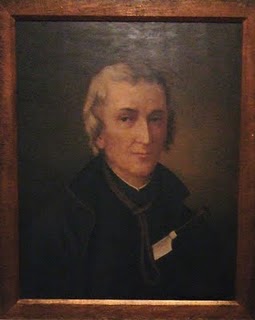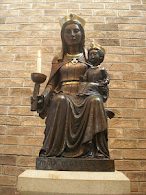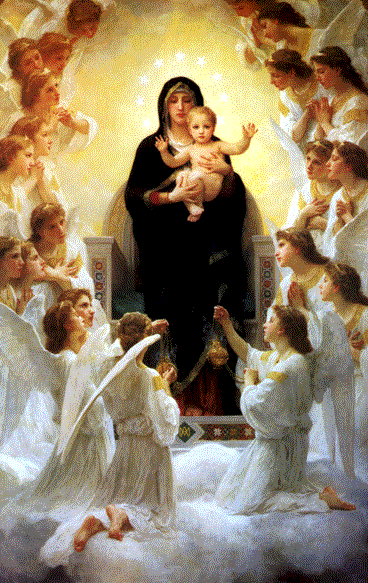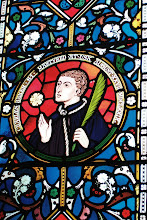As we continue our blogging trip in the footsteps of St David Lewis we come to Abergavenny. A pretty little market town, Abergavenny is the birthplace of St David Lewis and it has many associations with him. Today we will visit just a few of them and leave the rest until we can make a return blogging visit.

 , and a Protestant father, Morgan Lewis. Whether through expediency or religious conviction, Morgan made certain that his son, David, was brought up as a Protestant. Strangely, Margaret and Morgan’s other eight children were brought up as Catholics! David, as a Protestant, would have been baptised in St Mary’s Priory Church and attended services there. The beautiful font in the Priory Church is thought to be the one in which David would have been baptised. While the base is more recent, the bowl, with its rope design decoration, dates from the 12th century. During restoration of the church in the late 1800s, this bowl was found buried in the churchyard. It is believed that it was buried there between 1649 and 1660. During those years, the Commonwealth period, neither the adherents of the Old Faith nor those who followed the new Established religion were having an easy time, nor was infant baptism permitted. As a young man, David spent some time in Paris. While there he converted to Catholicism. Around 1636, Morgan Lewis also converted to Catholicism.
, and a Protestant father, Morgan Lewis. Whether through expediency or religious conviction, Morgan made certain that his son, David, was brought up as a Protestant. Strangely, Margaret and Morgan’s other eight children were brought up as Catholics! David, as a Protestant, would have been baptised in St Mary’s Priory Church and attended services there. The beautiful font in the Priory Church is thought to be the one in which David would have been baptised. While the base is more recent, the bowl, with its rope design decoration, dates from the 12th century. During restoration of the church in the late 1800s, this bowl was found buried in the churchyard. It is believed that it was buried there between 1649 and 1660. During those years, the Commonwealth period, neither the adherents of the Old Faith nor those who followed the new Established religion were having an easy time, nor was infant baptism permitted. As a young man, David spent some time in Paris. While there he converted to Catholicism. Around 1636, Morgan Lewis also converted to Catholicism.
During the anti-Catholic frenzy generated by the Popish Plot, fabricated by the lying Titus Oates, Catholics in general and Catholic priests in particular, were in even greater danger than usual. On 17th November 1678, armed dragoons arrived to arrest Fr David Lewis at Llantarnam. It was early on Sunday morning and the priest was preparing to celebrate Mass. He had been pursued by a false friend, John Arnold, and betrayed by a lapsed Catholic and former servant, William James. Fr Lewis was imprisoned in Monmouth Gaol until January 1679. He was then transferred to the new county Gaol at Usk. On 27th August 1679, Fr David Lewis was taken from Usk Gaol and executed for the crime of being a Catholic priest and saying Mass! He was canonised in October 1970 by Pope Paul VI.










.JPG)

.JPG)





Wow Breadgirl, this is very interesting. Thanks for adding the pictures to your writing. It certainly adds to the experience. :) How incredible finding the bowl. It's amazing that when he was born, he was the only one of all his siblings not baptized a Catholic. And then he became a priest!
ReplyDeleteGood morning Ron
ReplyDeleteThank you for your kind words. It is great of you to visit and I hope you will do so again. God bless you, too.
Good Morning Cheri
ReplyDeleteNice to hear from you again. Yes, it is amazing how things turn up sometimes and that baptismal font was a great find!
David not only became a Catholic but also a martyr and great saint. The Lord does indeed work in mysterious ways, doesn't He? The young David would certainly have grown up in a Catholic atmosphere because his mother was the sister of a Jesuit and the niece of a great Benedictine, Dom Augustine Baker. One of my earliest posts was on Dom Augustine Baker. If you get a chance sometime you may enjoy reading it. Oh, I have to admit that I cannot take any credit for the photographs. I am a hopeless photographer! But the Lord has compensated me by giving me a husband who is not only loving, kind and patient but also a good photographer!
Thanks for visiting & hope to hear from you again soon. God bless you Cheri.
Breadgirl,
ReplyDeleteA fascinating story! How strange that the one brought up Protestant out of all the children was the one to become a great saint and martyr. God's grace surely. The picture of the church was beautiful. I love old churches:)
Good Morning Mary
ReplyDeleteAs you said, it is surely God's grace that brings us to Him. St David Lewis had alot of very devote Catholics in his family and therefore he would have had a strong Catholic influence in his life. One of his nephews, also named David Lewis, became a Jesuit. His uncle, John Pritchard, was a Jesuit, and his great uncle, David Baker, is famous as the great Benedictine writer and mystic, Dom Augstine Baker. You may have heard of him. A little while ago I did a post on the family of St David Lewis. If you get time, you might find that interesting to read. Thanks for your lovely visit, Mary, and God bless you.
Sorry it took me so long to comment on your blog. I found this very fascinating. Learned something! Thank you!
ReplyDeleteSo after learning about a Welsh Saint, I wanted to send you a Welsh Blessing:
Welsh Blessing by Laurie Leah Levine
“Grant us, O God, your protection; and in your protection, strength; and in strength, understanding; and in understanding, knowledge; and in knowledge, the knowledge of justice; and in the knowledge of justice, the love of justice; and in that love, the love of existence; and in the love of existence, the love of God, God and all goodness, Amen.”
breadgirl,
ReplyDeleteAnother wonderful post! I agree with Mary333,
How interesting that the one brought up Protestant out of all the children was the one to become a great saint and martyr.
Simply amazing!
Good morning Lady Lighthouse Pearl
ReplyDeleteThanks for your visit. It is nice to hear from you. Thanks also for the lovely Welsh blessing. If you don'st mind, I will probably use it in a future post. I hope you will visit often. God bless you.
Good morning Daily Grace
ReplyDeleteLovely to hear from you. Yes, it is interesting that St David Lewis was the only one brought up a Protestant and yet he was the one who became a priest, a martyr and a saint. God's ways are indeed marvellous! God bless you Daily Grace.
Thank you for visiting my Blog and leaving a comment there. Please encourage others to do the same to help a charity. Thanx.
ReplyDeleteGod bless.
Hello Victor
ReplyDeleteI certainly will do that. It is a very worthwhile thing you are doing. God bless you.
I had never heard or St. David Lewis but I read something about him in a book called Catholicism & Reason. I looked him up and found this blog. Thanks for the info.
ReplyDeleteHi Anonymous
ReplyDeleteMy aim is simply to make St David Lewis better known so I hope you found this blog informative and helpful. Thank you for visiting and for taking the time to leave your nice comment. God bless you.